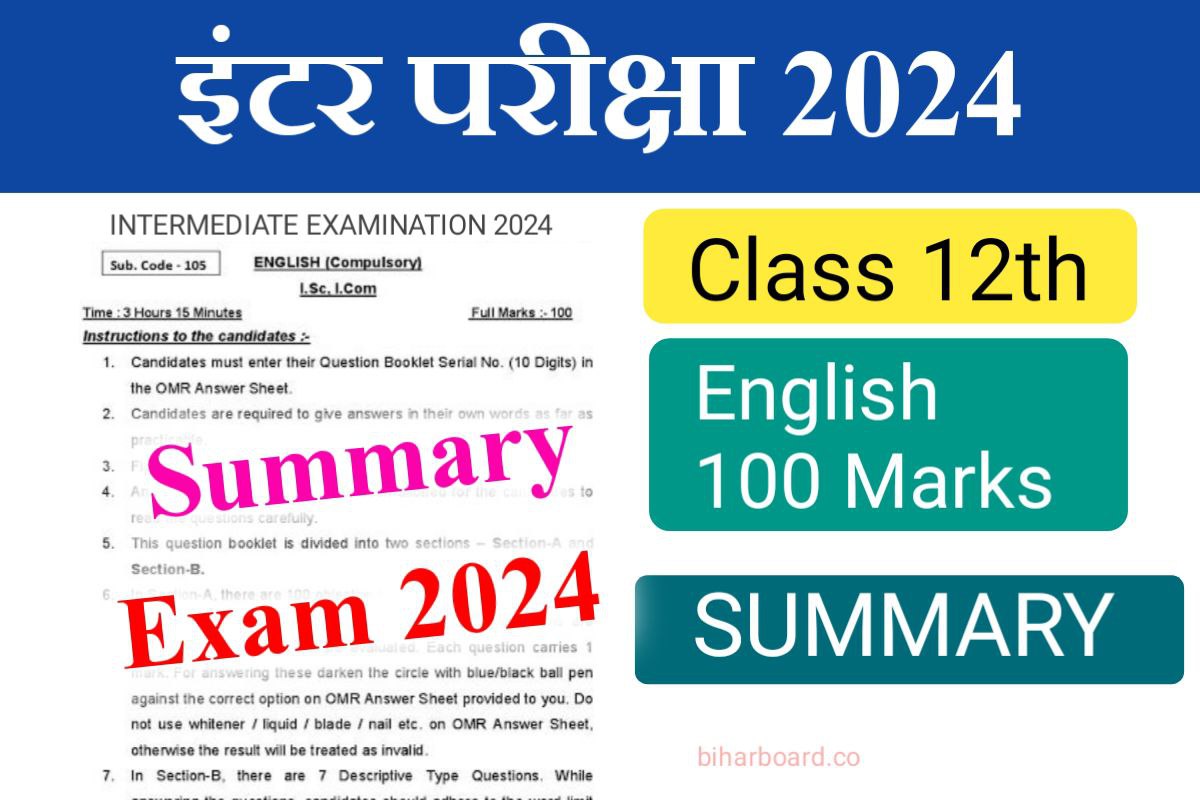BSEB 12th English 100 Marks Important Summary 2024: आपके परीक्षा के लिए Important Summary Exam 2024, Bihar Board
1. Fire-Hymn: Summary
Keki N. Daruwalla is an eminent poet who is known for painting impressionistic pictures of rural landscape. In this poem the poet describes a burning ghat. It looked as if red light was leaping out of it. The sky looked like a red ball. Although the ghat was burning, smoke was also coming and slowly enveloping everything around it. The poet then associates himself with the fire. As a Parsi whose religion was Zoroastrian he wishes the fire to continue burning as it symbolised knowledge, purity and goodness. The poet had to consign his new born into fire because there was no tower of silence there. The poet considers it to be his duty to remind the fire never to stop burning as the fire would be committing the sin of burning the body partly only. He regrets that he could not save the fire from committing sin and he also regrets that he has also become a sinner by forgetting to remind the fire: However he is happy that he has been forgiven.
2. Ode to Autumn: Summary
This poem has been composed by John Keats. It is really a very beautiful poem. In this poem, the poet describes the beauty and pleasure of the Autumn season. According to the poet, it is very a pleasant season. It is with mists and maturing sun. The trees and plants are with fruit and flowers Greenery can be seen everywhere. They had beauty in nature. The grain begins to ripe. Leaves and buds begin to grow on trees. In this season we can feel neither hot nor too cold. Wind keeps on blowing. It invites the summer and both make the fruit ready. Birds sing sweet songs and they fill the human heart. People are very happy to see the crops, fruit flowers and beautiful scene of Nature.
The tired traveller sit on the green floor. The poet describes the vines, apple-trees and hazel etc in this poem.
He says that bees hover over flowers. Everything gives Joy to man. He says that it is not second to spring. He describes swallows, Robin, Cricket etc. in this poem. He says that really autumn presents memorable pictures of Nature.
3. A Child is Born: Summary
“A Child is born” is an extract. It has been written by ‘Germine Greer’. It explores the cultural peculiarities of the east and the west regarding child birth and parents child relation.
A child is born, is always attended. The ways of managing child-birth are varied in traditional society. The mother does not have pychic burden. She will have reinforcements for many of ritual observances of pregnancy Clearly in fact and mother mortality is greater in traditional birth.
In many socities woman still goes forth from their mother’s house at marriage to live with a mother-in-law and the wives of their husband. It is truism of anthropology that such women
donot become members of their new family untill they have borne a child. In such societies the marriage was quite likely to have been arranged the bride longs for the child. In many traditional society the relationship between mother and child is more important than the relationship between husband and wife. If the girl is lucky and her parents are alive, she goes to her mother’s house for the last month of her pregnancy and live about the first three month of the baby’s life. When the baby is born it is an occassion of joy for the whole family.
The naming ceremony is lovely. It is held when the baby is. seven days old. A new dress is brought for it and new sari for the mother. There is feasting and singing until late at night. The
women and girls gather and sing songs. Garlands of turmeric and garlice are worn toward off evil spirits. That is when the name is chosen. The ceremony si held. We sit together eating pan singing. Some of us might be young unmarried girls, others aged ladies of Forty or Fifty. There are many Jokes, so much laughters. People look funny but time is changed woman will not offer their body and mind to such brutality. The voice of women raised around the world against the brutality of women during pregnancy.
4.India Through a Traveller’s Eye: Summary
India had always been part of the background of my life, but I had never seen, it whole and for myself until now. Yet the stories that our Indian family doctor and his wife told me when I was child had woven themselves into my growing dreams, and I had long read everything that I could find about that country-from my father I had learned of it through Buddhism and the life history of the Lord Buddha. When did I got to India to see, not the Taj Mahal, although I did see it any by moonlight, not Fatehpur Sikri,. although I did see it, and not the glories of empire in New Delhi, although I did see them. I want to see India, to see and listen to two groups of people, the young intellectuals in the cities and the peasants in the villages. There I met in little room in the city, in little houses in the villages, and I heard their plans for freedom. Already the intellectuals believed that another world war was inevitable. They had been bitterly disappointed after the first world war by what they felt, were the broken promises of England. The English, they declared, had no real purpose to restore India to the people. I could believe
it fresh as I was from China. Where the period of people’s Tutelage seemed endless and self government further off every year. ‘When you are ready for independence, conquerors have always said to their subjects, etcetra! But who is to decide when that moment comes and how can people learn to govern themselves except by doing it? So the intellectuals in India were Restless and embittered, and I sat though hours watching their plashing dark eyes and.
(c) No language is self sufficient in enriching its vocabulary. Every language has to invent or borrow words from other languages to express new concepts and ideas. English is no exception to this. It has been borrowing words from the famous language like Latin, French, Greek, Spanish and even Hindi. Borrowing continued in its three periods of growth namely old English period, Middle English period and modern English period. Even Hindi word like thing, bundh, Lathi, jail are commonly used in English
Read Also :-

